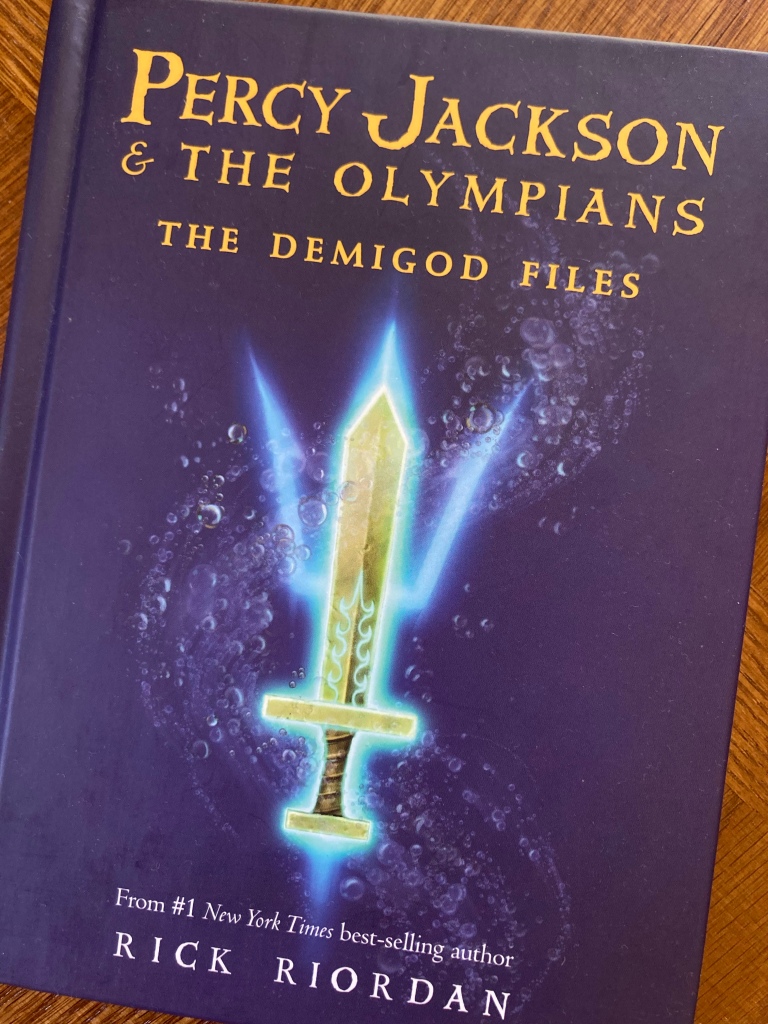After living in Athens for a month, I set a reading goal for our return home: Tim and I would read Rick Riordan’s Percy Jackson and the Olympians series together. I spent more than one occasion in Greece and Turkey identifying and describing the Greek pantheon (and their Roman counterparts) for Tim as we toured and explored the ancient sites. Percy Jackson, I knew, would be the best way to immerse Tim in mythology, giving him a basic reference point.

Percy Jackson’s short life is marked by strange happenings, several school expulsions, and academic struggles due to ADHD and dyslexia. However, when he vaporizes his math teacher with a ballpoint pen (that may also be a sword), he realizes there’s an explanation for all the weird things in his life.
Arriving at Camp Half-Blood, a summer training camp for demigods, Percy is thrown into an argument between Zeus, Hades, and Poseidon and must embark on a quest to prevent the next world war. But that’s just Book 1.
This plot ties into the prophecy – the one about the chosen child of the Big Three gods that will save the world from destruction. Is Percy the chosen one? And if he is, can he save the world?
Though the series is below our reading level, it’s humorous, engaging, and (in part) not predictable. Tim had his theories throughout, but he wasn’t able to guess every twist – much to my delight! We read the five books rather quickly this past summer; I read most of the series aloud during our road trips to visit family and friends after our year abroad.

Overall, Tim enjoyed the books, and maybe one day I’ll be able to talk him into the others. Hopefully The Kane Chronicles if nothing else. I enjoyed re-reading the series, especially after reading Riordan’s many other books. It was fun to jog my memory and re-familiarize myself with the various characters’ backstories, especially Nico’s.
I love Nico’s character arc, watching as he transforms from lovable kid to angsty teenager to a humble and trying-to-be-better young adult. I got more Nico in The Sun and the Star, a (as of now) standalone book centered on Nico and Will Solace.
Following on the heels of the final book in The Trials of Apollo, we are (re)introduced to a Nico that is emotionally raw – as if that’s new, I know. But he’s just lost Jason and the other six are off living life, leaving Nico feeling isolated (again).
Despite this, things should be pretty peaceful; the world’s just been saved, after all, and Nico, for the first time, is buoyed by a new kind of friendship – his relationship with Will Solace, son of Apollo. Yet, he keeps having dreams, hearing a voice call out to him from Tartarus.
Believing it to be Bob the Titan, and convinced by Rachel’s latest prophecy, Nico sets off on a quest to save him. But Will won’t let him go alone, even though the darkest part of the world is no place for a child of the sun god.
The story is built on emotional ups and downs (too many in my opinion) as Nico and Will navigate fears, doubts, and guilt, haunted by events in their pasts or worries of the future. Will the boys’ relationship survive this harrowing journey or will Tartarus break them?

For this novel, Riordan teamed up with Mark Oshiro (an award-winning YA novelist) so that they could bring an authentic queer perspective to the page. Though Riordan has written diversity very well in the past, bringing forward an array of cultural, ethnic, racial, and sexual backgrounds into his novels, it becomes a lot more challenging when a diverse supporting character suddenly becomes the main character. He hoped that Oshiro could “bring perspective, authenticity, and a different set of writing strengths to the project.”
To achieve this, Riordan did his best to ensure this work was a 50-50 collaboration, sharing the credit, compensation, workload, and creative input. Riordan started with a rough plot outline, Oshiro elaborated the outline, and after trading ideas for a while, Oshiro wrote the first draft. Once they received feedback from the editor, Riordan wrote an extensive second draft, and then the two traded feedback and editing.
epigone (n) [ep-i-gohn]: an undistinguished imitator, follower, or successor of an important writer, painter, etc.
Though it sounds like a pretty “fair” process, with Riordan at the helm, reading The Sun and the Star did not feel like a Riordan novel. For one, the characters were too emotional and were whiney and needy – this didn’t track with Nico’s character. At. All. It would have made sense, in terms of character arc, if Nico had become emotional as the story progressed, but it all seemed pretty high-strung from the off. I mean, therapy with Dionysus? Really? That’s out of character for both of them!
The humor didn’t lighten things like normal but felt more flat or forced. So, even though I enjoyed the storyline, the whole thing felt sort of forced and off, which was a very big disappointment. I just hope Chalice of the Gods fills the expectations that this story didn’t.